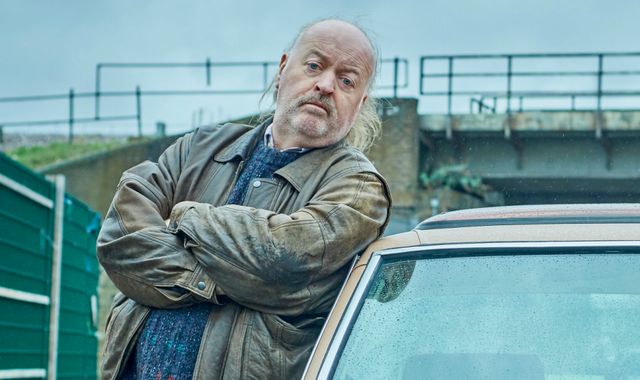Bill Bailey: We all need a laugh – but words matter, we need to think more
Written by News on 20/10/2019
Bill Bailey is running 10 minutes late for our interview for the most perfect Bill Bailey-esque reason.


The comedian is on his way from another meeting in another part of London and all was running to schedule, I’m told over the phone, but apologies; unfortunately, Bill has spotted a dockless electric bike outside and had to have a go.
So Bill Bailey is enjoying a spontaneous cycle ride around the block, but he shouldn’t be long.
“I’ll try to get him off now,” says the representative.
As reasons for tardiness go, this is more than satisfactory. Who am I to deny Bill Bailey a whimsical e-bike whizz around central London?
It is no hyperbole to say that Bailey – comedian, actor, musician, author, panellist, presenter – is one of the most loved acts in the business.
At the moment, he is touring on and off, and you can also see the 54-year-old on screen in the second series of In The Long Run, the autobiographical, feel-good comedy created by Idris Elba, which launched on Sky One in 2018.
Drawn from the Hollywood star’s childhood memories of growing up in a West African family living in Hackney in the 1980s, the series focuses on Walter (Elba), a factory worker from Sierra Leone, a version of the actor’s late father.
Bailey plays his workmate, friend and neighbour Bagpipes – “a bit of a goof… a bit emotionally stunted, but a caring, warm-hearted kind of person”.
A portrait of community and family life set to a backdrop of orange and ochre furnishings, the series has “a real ring of authenticity to it” because it is based on Elba’s own background, says Bailey.
“There’s this wonderful combination of accents and dialects and a take on British culture which was kind of new and fresh and something I hadn’t really seen or heard much of on TV,” he says.
“It’s a very warm, very funny family comedy, and what attracted me to it was that it captured the energy of the ’80s. It also resonated with me because I first came to London when I was a teenager in the ’80s, right about the time this is set. And it has this terrific ’80s soundtrack as well, which gives it the energy, the fizz, the crackle.”
It’s a light-hearted series, but the events and issues of the times, the political turmoil, unemployment, racial prejudice, are woven into the narrative.
“It was such a transformative decade in many ways and not all good, obviously,” says Bailey. “I came to London when I was a teenager and my memories of it are of a time of protests. There were riots and there were strikes and it was a time of conflict, but there was a kind of energy to London which I was really drawn to. It was quite mesmerising in a way, coming from where I grew up in the West Country, it was a bit sleepy by comparison.
“So it was very exciting and yes it was probably a tough decade but it was also an acquisitional one, where people wanted to get on. They felt this need to make something of themselves.”
With Brexit rumbling on, there are of course many parallels with Britain in 2019.
“In some ways, nothing’s changed. But of course, everything has changed. There are parallels to what’s happening now; the protests are perhaps for different reasons but still, we’re in an almost unprecedented era of tumult and political turmoil.
“[In The Long Run] is about people trying to get on and make do with the circumstances that they have, and I think that element of it very much has parallels to today.”
Bailey describes Elba as “a lovely guy, very generous” and “a naturally gifted actor”. And it’s “a big deal” for him to have effectively told his life story in this way, he says.
“To dramatise, basically, effectively what is his life and his family… I mean, imagine writing a show where you’re talking about you, where you’re playing your own father or your own mother.
“It’s quite odd, surreal in some ways. Sometimes we’d do a scene and he’d say, ‘I remember this. This happened’.
“It’s quite a brave thing to do actually, to mine your own personal experience, your own life, for something like this. So all credit to him for that.”
For those who know Elba the Hollywood star; as DCI John Luther, or The Wire drug kingpin Stringer Bell, his Thor Avengers character Heimdall, Nelson Mandela or even Shere Khan, his role as Walter might seem very much against type, his humble beginnings possibly surprising.
“It might be surprising to some people because they’ve maybe seen him in The Wire or in the Thor movies or in Luther but you get a sense here that he’s much more playful, and he’s playing his father who was a bit of a character,” says Bailey. “He was a provider… but quite mischievous.
“It’s great to show another side of yourself as an actor. I think that’s something clearly he wanted to do, something a bit more light, a bit more fun, a bit of comedy, because he often plays a tough guy in TV shows or in movies.
“[Walter] is very much the head of the family and the foreman in the factory, so he’s still quite an imposing presence, but I think this is a much lighter side to him which I think he wanted to show.”
Bailey is currently touring his latest stand-up show, Larks In Transit, a “compendium of travellers’ tales and the general shenanigans of 20 years as a travelling comedian”.
Basically, “all the things that go wrong, the things that happen to you, the ideas you have along the way”, he says.
While social change and increased awareness about issues such as race, class, sexuality and gender has led to some comedians bemoaning “snowflake culture”, Bailey takes the opposite view.
“I think that comedy, if it’s working, should be able to represent or reflect what society is doing,” he says. “And society is changing, there’s no doubt, and hopefully for the better.”
While there’s always a pendulum swing with any major cultural shift, he says, this is how social evolution works.
“That’s a problem with any major change, there’s always going to be a process where there’s a bit of a backlash to something and then another backlash, and then it moves forward and then judders and stops a bit, and goes back a bit and then it goes forward again. And that’s how social evolution happens, it doesn’t happen smoothly.”
:: Listen to the Backstage podcast on Apple Podcasts, Google Podcasts, Spotify, Spreaker
He gives the #MeToo movement as an example.
“You hear people now talking about it and saying, ‘oh, you know, we’ve become a victim culture’. There’s become a backlash to it! Which I just… I guess it’s inevitable in some cases but also, it doesn’t help.
“[Change] is necessary for us to live better, to be better to each other, and to basically get this stuff out in the open and get it talked about and really move on. If we don’t talk about things, problems don’t get solved, society doesn’t move on.
“I think this has cracked open a whole set of questions that have to be looked at: the notion of power, the notion of male dominance, the notion of diversity, the notion of all these things that never really got talked about properly.
“These things have to be dealt with, because otherwise we don’t progress as a society.”
Has the shift in the past couple of years caused Bailey to think more?
“There’s a tipping point, a critical mass point where… for example, let’s say Harvey Weinstein. Eighty women come forward to say they’ve been victims of him, sexual assault. That’s a huge number.
“I remember talking about this round the dinner table at home with my wife and a bunch of her female friends, and to my horror – and I guess to my naivety – I was shocked by the fact that every single woman at the table had some story that was similar to these stories; in the workplace, at school, even, going back to college. And they all kind of shrugged and went, ‘Yep. Tell me about it’.
“What about all the people that are going through this all the time that don’t get the attention, that don’t have a voice? And so I thought yes, that’s why these things are important, because it allows the conversation to be had. People are then, ‘Ah, right, we have to actually now think about this’. Which is good, of course that’s good.
“Sometimes it takes that, it takes individuals to have the courage to do this, to come forward and something like this to happen, some monster like Weinstein to be revealed, for this to have an effect on wider society.”
Comedy is about “puncturing taboos”, says Bailey. So he does worry that today’s enlightened world could leave comedy in a difficult place.
“It’s always been about, let’s take an alternative view of this,” he explains. “So there’s almost a bit of a worry… that comedy could take itself down a blind alley here.
“Because if comedy starts to puncture things like the accepted norms, which are being nice to people, respecting women more, respecting minorities more, being less racist, being all of these things. If that’s the mainstream view now then comedy’s view is to sort of puncture that – well, that leaves comedy in a very difficult place, because to be alternative and to be radical you’re almost having to be reactionary.
“That’s where comedy is in a bit of a bind, you know, to find the funny in absurdity and society but without almost falling victim to going along with the kind of reactionary versions of society that have led us here in the first place.”
It all requires a bit more thinking, a bit more effort, he says. Which is no bad thing.
“You have to think a bit more about everything. Words are very important… An ill-considered tweet can lead to people losing their jobs, people getting fired, people not hosting the Oscars – major career things can happen through ill-considered words.”
Every case is different, he agrees, but Bailey doesn’t buy the defence of history.
“‘Oh, I said it five years ago!’ Well, hold on. You weren’t a child then. If you’re 22 now and you tweeted when you were eight, then okay. But if you’re a grown person… once you get past 30, you’re cooked. You ain’t going to change much.
“I think rather than throw our hands up and say, ‘Oh, it’s all PC gone mad’, I think it just means we have to think more. We have to be more considerate.
“There’s still room for comedy. God knows we all need a laugh. God knows there’s absurdity in our situation, but you have to think more about it. It requires a bit more effort.”
Idris Elba’s In The long Run returns to Sky One and streaming service NOW TV at 10pm on Wednesday 16 October, with all episodes available to download on demand
(c) Sky News 2019: Bill Bailey: We all need a laugh – but words matter, we need to think more







